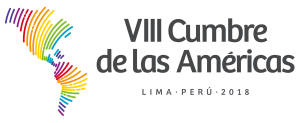Carlos Sánchez Berzaín
April 5, 2018
 (Interamerican Institute for Democracy) “Democratic governance against corruption” is the main theme of the eighth Summit of the Americas (10-14 April, Lima, Peru) in a region divided into “two Americas” between those countries with democracy and dictatorial regimes of organized crime. None of the essential components of democracy are respected in Cuba, Venezuela, Bolivia, and Nicaragua whose presidents have corruption and impunity as their objective in order to remain indefinitely in power. This fragile context is the challenge for democratic leaders of the Americas who need to be different than the organized crime chieftains.
(Interamerican Institute for Democracy) “Democratic governance against corruption” is the main theme of the eighth Summit of the Americas (10-14 April, Lima, Peru) in a region divided into “two Americas” between those countries with democracy and dictatorial regimes of organized crime. None of the essential components of democracy are respected in Cuba, Venezuela, Bolivia, and Nicaragua whose presidents have corruption and impunity as their objective in order to remain indefinitely in power. This fragile context is the challenge for democratic leaders of the Americas who need to be different than the organized crime chieftains.
The Organization of American States (OAS) has, as its basis, the Interamerican Democratic Charter through which it spells out that “the essential components of democracy are, amongst others; respect for human rights and basic freedoms, access to and exercise of power subject to the Rule of Law, the conduct of elections periodically, free, fair, and based on the universal and secret suffrage as an expression of the people’s sovereignty; a plural regime of multiple political parties and organizations, and the separation and independence of the branches of government.
The Summit of the Americas “are periodic meetings that gather Heads of State and governments democratically elected to debate and make decisions on the region’s relevant matters”. They are conceived “to debate on shared political concerns, to affirm common values and commit to coordinated actions at the local and regional levels in order to confront present and future challenges facing the nations of the Americas.
Governance, according to the OAS means “institutional stability and effectiveness in decision making and management. . .” The PNUD focuses “democratic governance” as “the challenge to create institutions and processes that better respond to the needs of ordinary citizens, including the poor”, seeking “to foster the participation, the responsibility, and the effectiveness at all levels.”
This framework of principles and institutionalism enables us to differentiate that which is corruption as a crime and a political act in a democracy from that which is corruption as an essential component of non-democratic regimes that have made power to be an instrument of Transnational Organized Crime, as defined by the “Palermo Convention.”
In a democracy, corruption is not the rule but the flaw, it is the violation of normalcy, “the misuse of governmental power to get illegitimate advantages, generally in a secret or private way”, it is “the consistent practice of utilizing the functions and means of the government for the benefit –whether this benefit be financial or otherwise- of those who are involved in it.” In a democracy, there are investigations, prosecution, and punishment with accountability, there is separation and independence of the branches of government, the Rule of Law exists, and there is freedom of the press. On the other hand, however, in dictatorships, corruption is the means, the cause, and the end objective of getting to, and indefinitely remaining in, power.
The better democracy is, the more control and punishment of corruption there is, because there is freedom and transparency as shown by Peru, Brazil, Chile, Costa Rica, the United States in their dealing with the “Lava Jato” scandal or the transnational organized corruption of the Forum of Sao Paolo with Odebrecht and the other construction companies. The flip side of that, in the dictatorships of Cuba, Venezuela, Bolivia, Nicaragua, and Ecuador/Correa, there is concealment, cover-up, and impunity.
The designator as Regimes with Organized Crime to Cuba, Venezuela, Bolivia, and Nicaragua is owed to crimes that go far beyond corruption in their governmental contracts. It is due to crimes against life, perpetrated through institutionalized violence, massacres, and humanitarian crises; crimes against freedom with political persecutions, jailing, political exiles and forced migrations, narcotics trafficking with narco-states as Venezuela and Bolivia are now known as. It is for crimes against the state’s security, such as; terrorism and the existence of irregular armed groups. It is for crimes against the national estate or patrimony, and other crimes stemming from the illegitimate and illegal holding of power.
The main theme of Lima’s Summit of the Americas is; what will democratic governments do against the organized crime instilled in the political power of Cuba, Venezuela, Bolivia, and Nicaragua? Maduro, the dictator, has not been invited to attend but his creator and mentor Raul Castro from Cuba and his partners Evo Morales from Bolivia, and Ortega from Nicaragua call for him to attend, and undoubtedly will represent him.
Published in Spanish by Diario las Américas on Sunday April 1st, 2018
 Carlos Sanchez Berzain Abogado | Estadista | Político | Politólogo
Carlos Sanchez Berzain Abogado | Estadista | Político | Politólogo